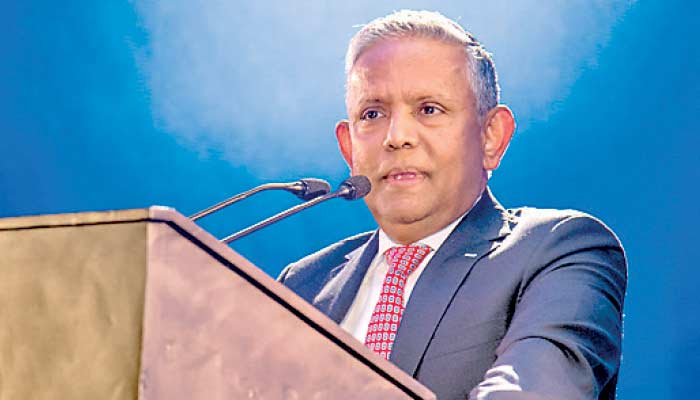Sunday Feb 22, 2026
Sunday Feb 22, 2026
Thursday, 9 October 2025 05:48 - - {{hitsCtrl.values.hits}}

Minor International Group CEO and Minor Hotels CEO Dillip Rajakarier – Pic by Ruwan Walpola
By Devan Daniel
Global hotel operator Minor International Group yesterday emphasised Sri Lanka’s recovery depends on brand building, better service, and a clean break from discount-led tourism.
Minor International Group CEO Dillip Rajakarier used his keynote at CA Sri Lanka’s 46th National Conference to explain his own journey at Minor, the company’s near-failure during COVID-19, and how it rebounded, then mapped the country’s opportunity and the friction points holding the industry back.
Minor International (MINT) is a global company focused on two core businesses: hospitality and restaurants. MINT is a hotel owner, operator and investor with a portfolio of 643 hotels under the Anantara, Avani, Oaks, Tivoli, NH Collection, NH, nhow, Elewana, Wolseley, Four Seasons, St. Regis, JW Marriott and Radisson Blu brands in 65 countries across Asia Pacific, the Middle East, Africa, the Indian Ocean, Europe and the Americas.
Rajakarier became CEO of Minor Hotels in 2011 and Group CEO of Minor International in early 2020 as the pandemic hit. Today, he oversees more than 530 properties in 56 countries, along with food and retail businesses of about 2,500 dining outlets and nearly 400 points of sale. His finance and IT background pushed digital transformation across operations and strategy.
The defining test was the 2018 acquisition of NH Hotel Group. “At the time, we had around 120 hotels and we set out to buy 385 more. It looked like the best deal in 2018 and became the worst deal in COVID,” he said. With hotels and restaurants shut, Minor lost about a billion dollars in 18 months.
“It is not how you fall, it is how fast you rebound,” he said, noting the company delivered record results by 2022 and is now expanding NH brands into new markets. Minor has roughly 85,000 rooms and hosts about 85,000 guests a day, which he framed as the payoff for thinking global and taking calculated risks. “To take risks and fail is not a failure. If you do not take risks, you fail.”
He told Sri Lanka to build clusters that link tourism with IT, logistics, and agriculture, and to move from being a producer to a brand builder. He cited Minor’s food play in Thailand, which shifted from franchising a global pizza chain to creating The Pizza Company, localised for Thai tastes and later franchised abroad. The lesson, he said, is to own the brand and the story.
Tourism should be Sri Lanka’s springboard, but not by chasing volumes. “We talk about 2 million tourists. That does not add to GDP unless it is value tourism,” he said. He pointed to Thailand’s “soft power” boost from the White Lotus series, filmed in Minor hotels, which helped lift rates by more than 40%. By contrast, Sri Lanka is positioned as one of the cheapest destinations, where a room can be had for about $ 60. “For $ 60, I cannot travel from London to Birmingham,” he said.
He called for a national brand that is consistent, powerful, and aspirational. “Tourists do not buy hotels. They buy a story.”
He described Sri Lanka as a living museum, wellness sanctuary, and adventure playground that can win on authenticity if the service chain works. A recent fast-track arrival in Colombo still took him about an hour because the business-class lane doubled for airline crews.
“This is not seamless tourism. This is painful tourism,” he said.
His prescription was simple. Invest in infrastructure and people. Train for service. Make airports and roads work. Remove frictions that kill the premium the country seeks.
Sustainability, he said, must be strategy, not marketing. The next wave of travellers will choose destinations that enforce it. Sri Lanka can lead in eco-tourism, community tourism, and wellness. Get this right and tourism brings foreign exchange and rebrands the nation as authentic and resilient.